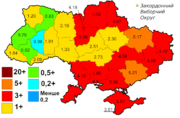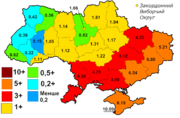Progressive Socialist Party of Ukraine
The Progressive Socialist Party of Ukraine (PSPU) (Ukrainian: Прогресивна соціалістична партія України, romanized: Prohresyvna sotsialistychna partiya Ukrayiny, Russian: Прогрессивная социалистическая партия Украины, romanized: Progressivnaya sotsialisticheskaya partiya Ukrainy) is a pro-Russian political party in Ukraine, led by Nataliya Vitrenko.
 | |
| Leader | Nataliya Vitrenko[1] |
| Founded | 1996 |
| Split from | Socialist Party of Ukraine |
| Headquarters | Kiev |
| Youth wing | Young Guard of PSPU |
| Ideology | Left-wing populism[2] Russophilia[3] Anti-Americanism National Bolshevism[4] Pan-Slavism[3] Social conservatism[5] |
| International affiliation | Eurasian Youth Union,[6] All-Russia People's Front |
| Colours | Red, blue |
| Party flag | |
 | |
| Website | |
| www.vitrenko.org | |
History
The party was created by Nataliya Vitrenko a then dissident member of the Socialist Party of Ukraine (SPU) in April 1996.[7] She led a group of more radical SPU members who opposed what they regarded as revisionist tendencies in the Socialist Party. In October 1995 they had left that party.[7] The Progressive Socialist Party of Ukraine is a party that supports the Eurasian Economic Union as an alternative to the EU and uses left-wing rhetoric. PSPU traditionally campaigns on an anti-NATO, anti-IMF and pro-Russian platform. During the 1998 parliamentary elections the party won 4,04%[8] of the vote, and its candidate for the 1999 presidential elections, Nataliya Vitrenko, came 4th, with 10.97% of the vote in the first round. The party's parliamentary faction was dissolved in February 2000.[9]
At the legislative elections on 30 March 2002, the party established the Nataliya Vitrenko Bloc alliance, including the Party of Educators of Ukraine (Ukrainian: Партія Освітян України).[10] It won 3.22%[8] of the votes, little short of passing the 4% threshold needed to enter the Verkhovna Rada.[11] PSPU was a vocal opponent of President Leonid Kuchma but supported Viktor Yanukovych, Ukrainian prime minister since 2002, during the 2004 elections. After the Orange Revolution of 2004, the party joined the opposition to new president Viktor Yushchenko in a coalition with the "Derzhava" (State) party led by former Ukrainian prosecutor Gennady Vasilyev. In the March 2006 parliamentary elections, the party again failed to gain any seats in Parliament, participating as People's Opposition Bloc of Natalia Vitrenko winning 2,93%.[8] At the 2007 parliamentary elections the party failed once more to enter the parliament, its result dropped to 1,32%.[8]
In the run-up to the 2010 presidential election the Progressive Socialist Party of Ukraine refused to join the Bloc of Left and Center-left Forces[12] since it did not want to be in the same election bloc as the Socialist Party of Ukraine.[13] Instead the party tried to nominate Natalia Vitrenko again as their candidate in that election[14] but the Central Election Commission of Ukraine refused to register her for failure to pay the required 2.5 million hryvnya nomination deposit.[15] Eventually the Progressive Socialist Party of Ukraine supported Party of Regions leader Viktor Yanukovych in the runoff of the 2010 presidential election.[1]
During the 2010 Ukrainian local elections, the party only won three representatives in the Sevastopol municipality.[16]
The party did not participate in the 2012 parliamentary elections.[17]
In 2011, the PSP decided to join the People's Front for Russia.[18]
The party did not participate in the 2014 parliamentary elections.[19]
The party will take part in the October 2015 Ukrainian local elections as part of the umbrella party Left Opposition.[20]
Election results maps
 1998
1998 2002
2002 2006
2006 2007
2007
Ideology
The party favoures Ukraine's full-scale entry in the Eurasian Economic Community (including its Customs Union); the protection of the non-aligned status of Ukraine; abolition of NATO exercises in Ukraine; giving the Russian language status as official language along with Ukrainian; annulment of former President Viktor Yushchenko's decrees on awarding the title of Hero of Ukraine.[1]
The party has close ties with the Eurasian Youth Union and its leader Alexandr Dugin. The party espouses conservatives positions and has often been accused of racism and antisemitism.[21][22]
References
- Progressive Socialists reelect Vitrenko as party leader, Kyiv Post (June 27, 2010)
- Географические закономерности электорального транзита в посткоммунистических странах by Rostislav Turovsky
- Tatiana (2014-04-15). Borderlands into Bordered Lands: Geopolitics of Identity in Post-Soviet Ukraine. ISBN 9783838260426.
- Kuzio, Taras (2015-06-23). Ukraine: Democratization, Corruption, and the New Russian Imperialism: Democratization, Corruption, and the New Russian Imperialism. ISBN 9781440835032.
- https://blogs.ucl.ac.uk/ssees/2014/05/09/south-eastern-ukraine-extremism-and-the-anti-maidan/
- Romanian, Russian fascists ally against Ukraine, Moldova, Kyiv Post (August 10, 2009)
- (in Ukrainian) УКРАЇНА ПАРТІЙНА. ЧАСТИНА V. СОЦІАЛІСТИЧНА ПАРТІЯ УКРАЇНИ SOCIALIST PARTY OF UKRAINE, ZN.UA (7 March 2002)
- (in Ukrainian) Прогресивна соціалістична партія України, Databases ASD
- State-Building: A Comparative Study of Ukraine, Lithuania, Belarus, and Russia by Verena Fritz, Central European University Press, 2008, ISBN 9637326995 (page 353)
- (in Ukrainian) Партія "Єдина Україна", Databases ASD
- Ukraine at the Crossroads: Economic Reforms in International Perspective by Axel Siedenberg (Editor), Lutz Hoffmann, Physica-Verlag Heidelberg, 1999, ISBN 3790811890/ISBN 978-3790811896 (page 184)
- Communists say leftist bloc will call for referendum on NATO and Russian language status, Kyiv Post (September 24, 2009)
- (in Ukrainian) Лівий блок як спосіб втриматися у великій політиці, BBC World Service (August 18, 2009)
- CEC registers two more candidates for Ukraine's president, Interfax-Ukraine (November 6, 2009)
- (in Russian) Украина обречена либо на распад, либо на революцию. Для украинской власти Конституция Украины – туалетная бумажка. Заявление Лидера ПСПУ Наталии Витренко, Official website of Natalia Vitrenko (November 11, 2009)
- (in Ukrainian) Results of the elections, preliminary data, on interactive maps by Ukrayinska Pravda (November 8, 2010)
- (in Ukrainian) Results of voting in single constituencies in 2012 & Nationwide list, Central Election Commission of Ukraine
- Прогрессивная социалистическая партия Украины присоединилась к "Интернациональной России" ОНФ
- Alphabetical Index of parties in 2014 Ukrainian parliamentary election, Central Election Commission of Ukraine
- (in Russian) The communists go to the polls in the "Left Opposition" - the leader of the Communist Party, RIA Novosti Ukraine (13 August 2015)
Five Ukrainian parties, 13 NGOs unite into Left Opposition, Interfax-Ukraine (15 June 2015) - "The Left Opposition that is not left | Workers' Liberty". www.workersliberty.org. Retrieved 2018-03-08.
- "South-Eastern Ukraine: Extremism and the Anti-Maidan | UCL UCL SSEES Research Blog". blogs.ucl.ac.uk. Retrieved 2018-03-08.
External links
- (in Russian and English) Official party web site
- (in Russian) "People's Opposition" pro-Vitrenko site